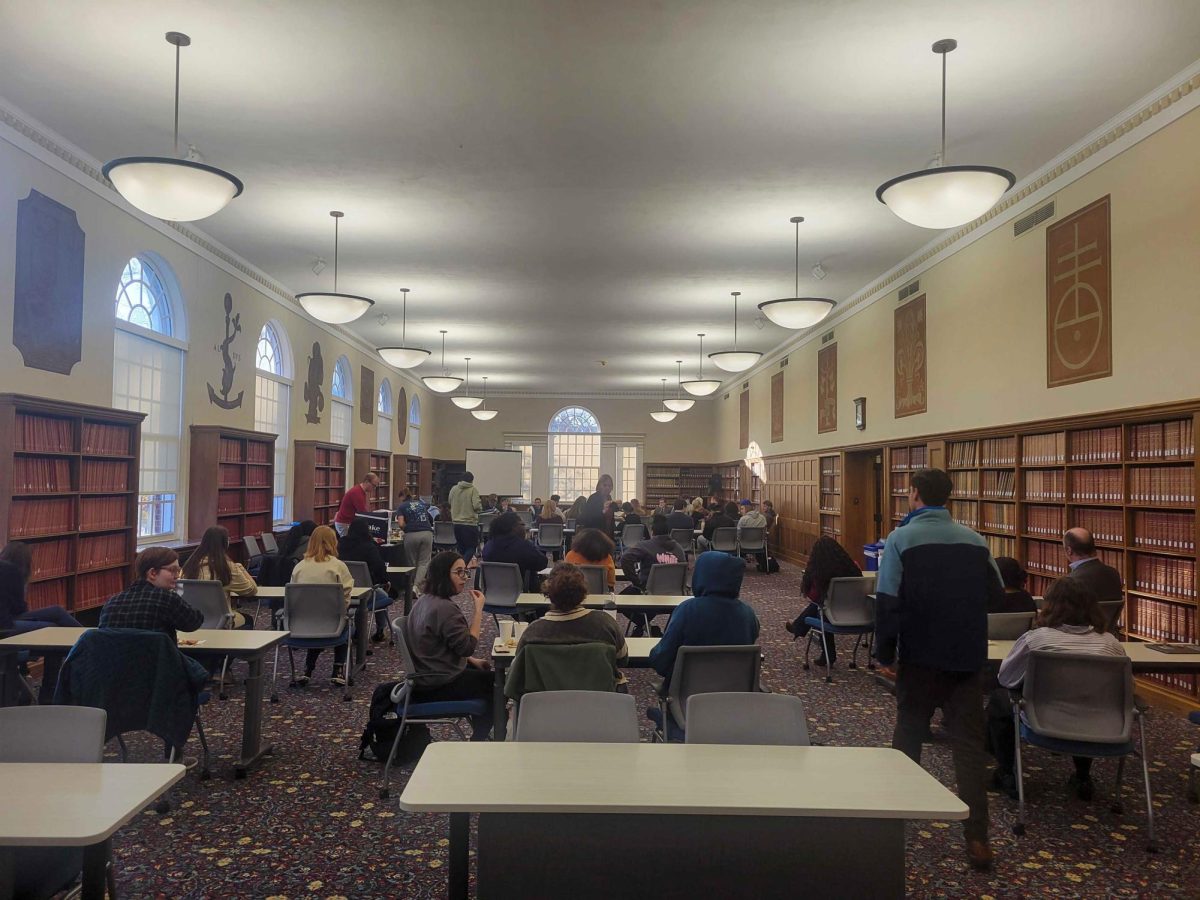On Tuesday, Nov. 5, the United States elected the 47th president. On Thursday, Nov. 7, Drake University faculty and staff gathered to talk about it.
Drake’s department of political science hosted a Q&A-style panel in the Reading Room of Cowles Library at 4 p.m. Professors David Skidmore, Adrien Halliez, Rachel Paine Caufield, Debra DeLaet and Kieran Williams offered their thoughts, comments and opinions. As Paine Caufield noted, their statements were rooted in their knowledge as political scientists and in regard to their personal areas of expertise.
In the minutes leading up to the start of the event, the atmosphere was vibrant and friendly – even jovial. Students were eating cookies, sharing cheese and crackers and enjoying hot chocolate as they moved chairs around and talked to friends. The political science professors were talking to their colleagues or to students.
But as Paine Caufield opened the floor up to discussion, the atmosphere quickly became more somber. Participants were serious and engaged, asking questions about Project 2025, the court systems and immigration. Professors, too, asked each other follow-up questions to the ones that students had asked.
Sophomore Caroline House was particularly interested in the conversation surrounding polling and swing states.
“I think hearing an outside perspective on swing states and how the polls, like the Selzer poll from Iowa predicted Iowa would go blue and then it completely went the opposite way, was interesting,” House said. “A lot of people were surprised by that and it was great to hear the political scientists’ perspective of that.”
Halliez explained why polling had been so difficult, especially since the pandemic. He mentioned that Trump supporters were more likely to not respond to polls, so that demographic would have been underrepresented in the polls. That could have made it difficult for pollsters to accurately scale their samples to be representative of populations.
Students appeared interested in what professors had to say. Questions reflected students’ concerns about how a second Trump presidency would impact the nation as a whole, as well as their personal lives. As Paine Caufield discussed the bureaucratic side of a mass deportation and Halliez analyzed what polling data meant for the future of abortion rights, students listened without interruption and used previous answers from the professors to form new questions.
The conversation and professors’ answers were honest. Several questions – as to the fate of Trump’s court cases, the future of the Department of Education or what a mass deportation would look like – elicited a truthful “I don’t know” from the political science department. Despite their expertise and educated guesses, the “I don’t know” sentiment underlines national uncertainty regarding how Donald Trump will act as executive starting on Jan. 20.
Specifically in regard to a question about the feasibility of a mass deportation, Williams posited a question that Trump and his campaign have yet to answer.
“Deport to where? Where are all of these people going to go? Governments of other countries might have an opinion on this,” Williams said.
Paine Caufield discussed the “bureaucratic constraints” of the mass deportation that Trump has planned. But, as she pointed out, a past Trump policy known as Schedule F might eliminate some of those constraints.
Schedule F was the name given to a specific executive order issued by Trump towards the end of his presidency, in 2020. That executive order would have stripped protections from civil servants perceived as disloyal to the president and would have created a new employment category for civil employees. While the order could have potentially impacted tens or hundreds of thousands of workers, it was never implemented; it was rescinded by the Biden Administration before it could go into effect.
Paine Caufield explained that re-issuing such an executive order “could quickly expand bureaucratic capacity” by creating a “new kind of bureaucrat directly responsive” to the president.
The conversation surrounding the Department of Education has particular implications for college students. Throughout his campaign trail, Trump has advocated for the elimination of the DOE. Paine Caufield explained that “the biggest impact would be on federal aid” and scholarships, as it’s the DOE that oversees the FAFSA process that many students are familiar with, which determines scholarships and federal aid eligibility. Paine Caufield added that there would be “other ways” to recover aid and scholarships at the federal level, but the specifics of how that might work was “uncertain.”
The panel spanned just over an hour and highlighted many of the issues that are going to define the next four years.
“It makes me happy that so many people felt the need to go and have that discussion,” House said.
The professors closed out the panel by giving recommendations on certain books or articles related to the current political climate. Some of those books included “How Democracies Die” by Steven Levitsky and Daniel Ziblatt (Skidmore’s recommendation), “Democracy’s Resilience to Populism’s Threat” by Kurt Weyland (Williams’ recommendation) and “Hillbilly Highway: The Transappalachian Migration and the Making of a White Working Class” by Max Fraser (Paine Caufield’s recommendation).
As Paine Caufield highlighted, the professors are political scientists, not mental health professionals. She recommended that anyone in need of emotional or mental support following the election contact Broadlawns or utilize the UWill services available to all Drake students. To make an appointment at the Broadlawns Counseling Center, call 515-216-5100. The UWill crisis line number is 833-646-1526.







